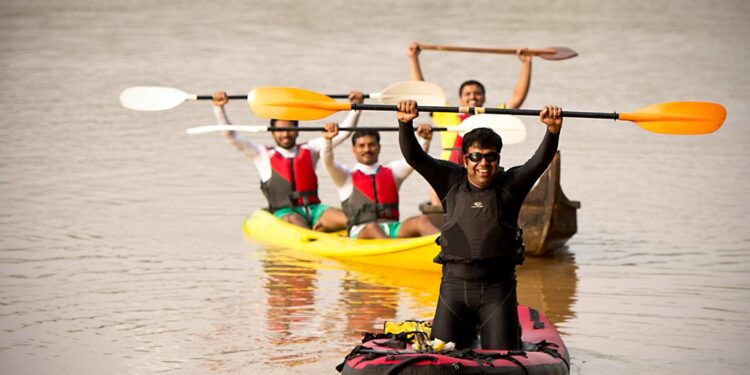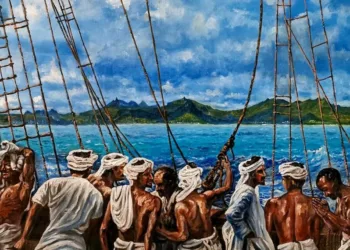A Non Resident Indian converts his passion for water sports into a marine ecological mission in the famed backwaters
BY ANIL NAIR
When he first sat in a kayak and paddled down a river, Kaushiq Kodothodika didn’t have the faintest idea that this activity would lead him to creating the world’s first ‘Marine Cemetery’ dedicated to reviving endangered fish species, including one called Miss Kerala, in ‘God’s own country’.
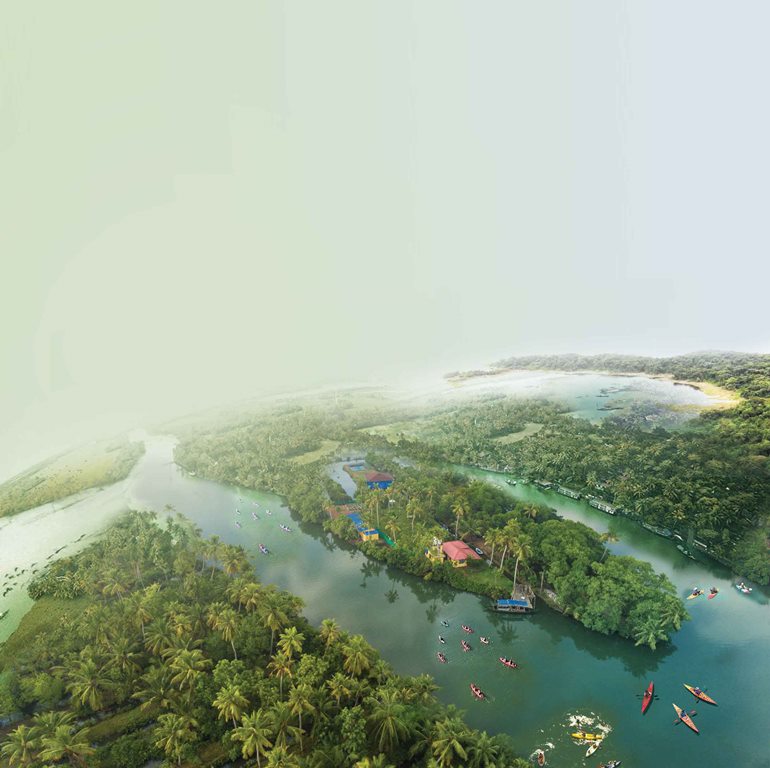
Kaushiq is from the fintech sales industry in Singapore and has in the past 10 years has used his passion for eco-friendly water sports such as kayaking, canoeing, stand up paddle boarding (SUP), rowing and sailing to set up Jellyfish Water Sports — a water sports and outdoor adventure centre in his hometown of Kozhikode in Kerala that focuses on promoting the river for recreational and sporting activities as well as drawing attention to the need to clean up the rivers. The Kodothodika family named the centre after they spotted a bloom of jellyfish in the area where they were paddling and the name appealed especially to their kids. A fun fact is that Kozhikode, a coastal city in God’s own country, was a significant spice trade centre and is close to Kappad beach, where Portuguese explorer Vasco da Gama landed in 1498.
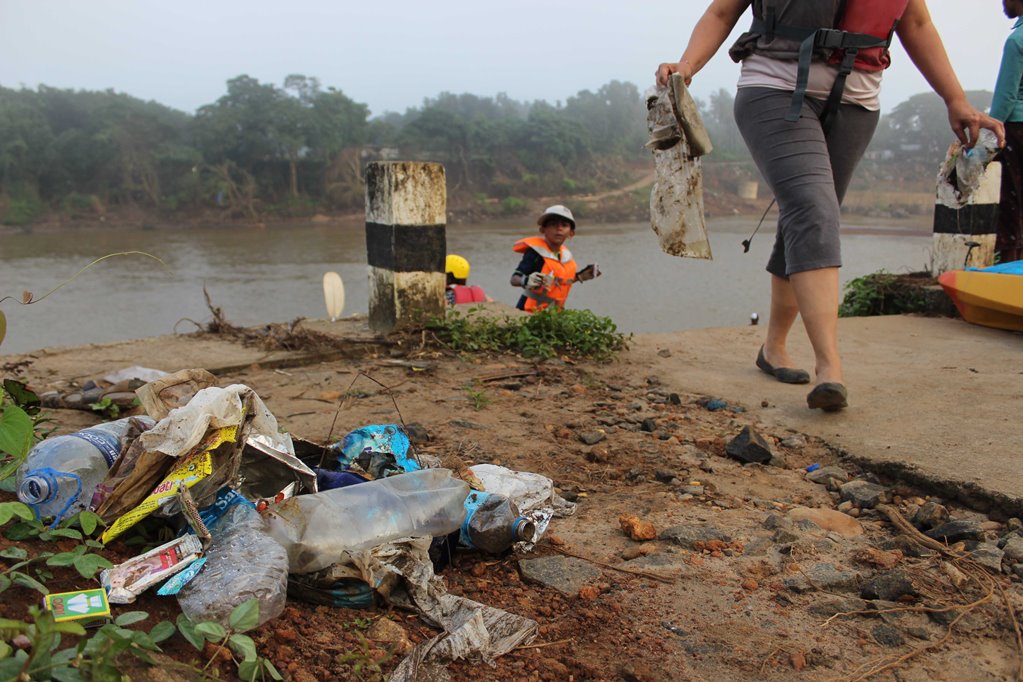
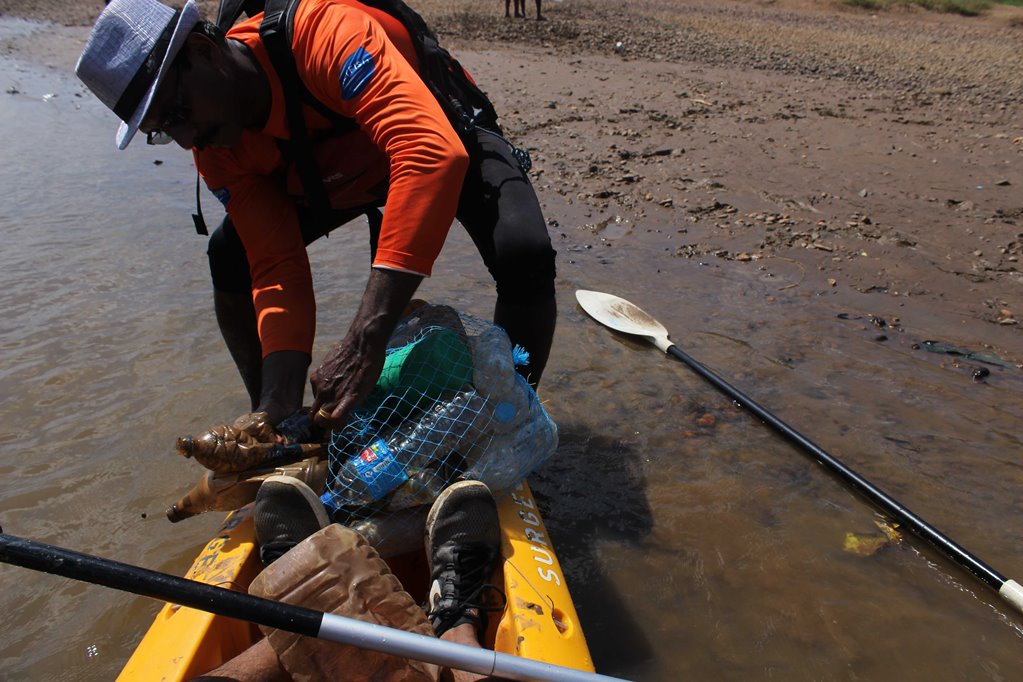
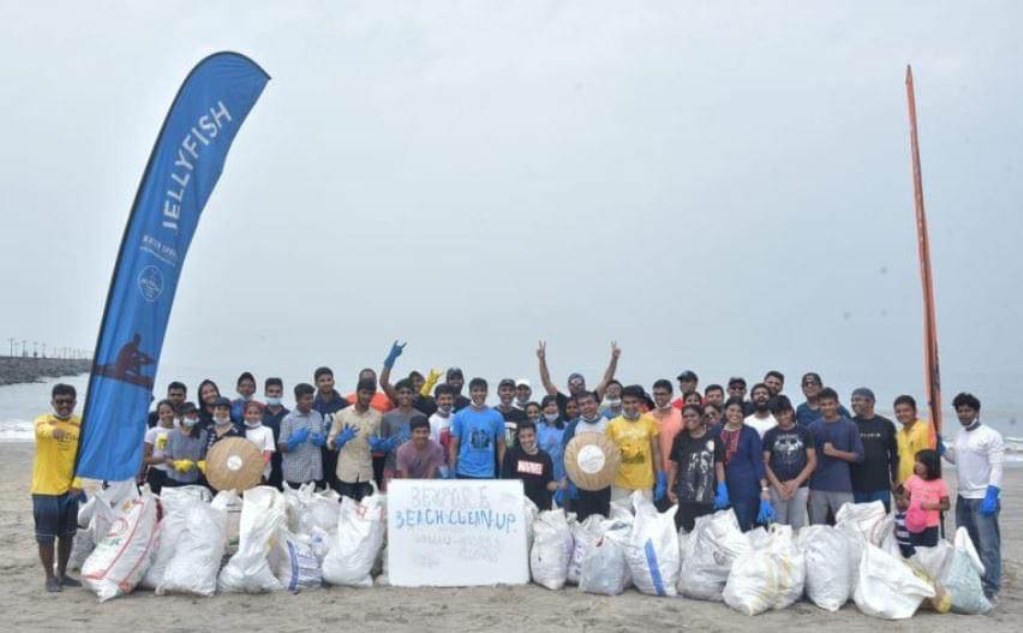
What began as a mission to promote recreational activity and clean up the river area near the Jellyfish camp alongside Kerala’s fourth longest river, Chaliyar, led to the creation of the Marine Cemetery, an art installation dedicated to nine endangered marine and riverine species, in 2019 on Beypore beach in Kozhikode. The Jellyfish team partnered with climate activist Akash Renison, the Beypore Port Authority and the Kozhikode district administration for this project.
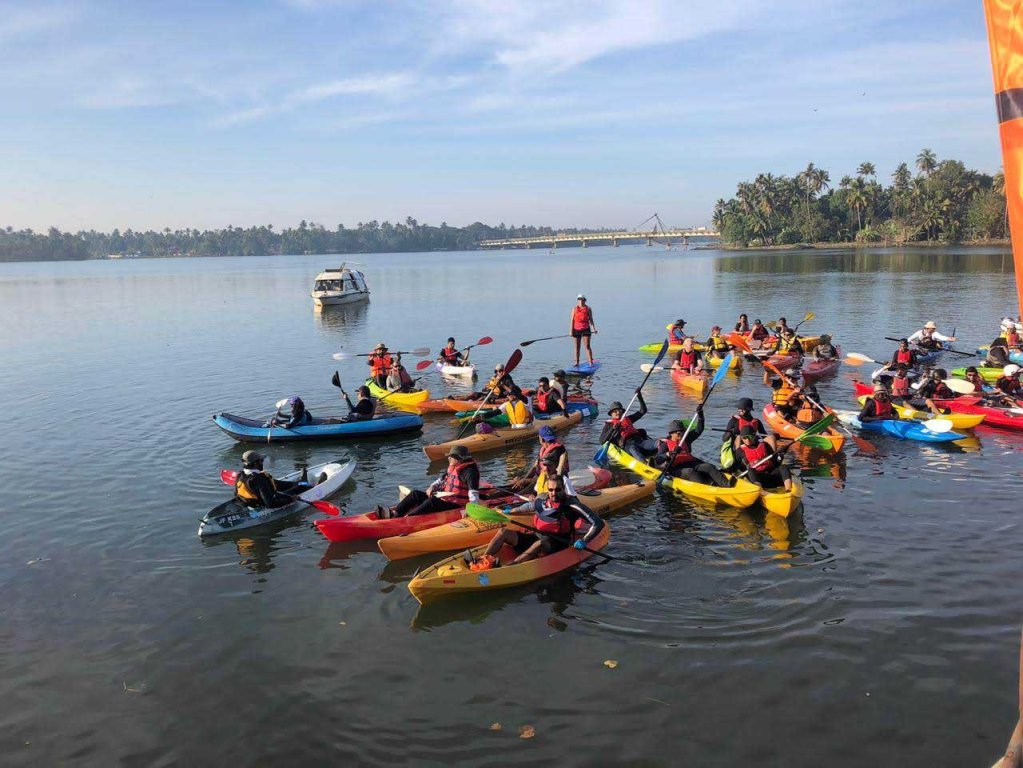
THE JELLYFISH JOURNEY
It all started in 2010 when the founding family of Jellyfish Water Sports bought an inflatable kayak from Dubai during their annual vacation and loved the experience. But they were disheartened to see the amount of floating garbage in the Chaliyar river. When they spoke to fishermen and people who lived on the banks, they realised everyone felt equally bad.
“This was the inspiration for creating the Jellyfish project. With its philosophy of Paddle to Preserve, it’s attracting everyone back to the waters for leisure, and recreational and serious water sports activities in Kerala so that there is awareness about the need to protect our waters,” says Kaushiq over the phone from Singapore.
Offering an alternative to mundane city life, the sports centre has succeeded in attracting enthusiasts to learning a new skill and enjoying the rivers with a two-pronged
approach: of encouraging water sports and shaping a new breed of eco- warriors.
Their first clients were family and friends who were aware of Kaushiq’s passion and thoroughness in safety measures. They paddled on the Chaliyar, stayed overnight on a nearby island, collected trash along the way and posted photos and videos.
As the club became popular and kayaking was accepted by the locals, team Jellyfish introduced the Chaliyar River Paddle event, which starts from the foothills of the Western Ghats in Nilambur and ends at Beypore where the Chaliyar meets the Arabian Sea. They held its seven edition last year.
JELLYFISH SPREADS ITS ECO- TENTACLES
Jellyfish has introduced varied sporting activities. These are kayaking, canoeing, stand-up paddling (SUP), sailing, and rowing. “We also offer fishing, camping, wall climbing, and stays in our luxury houseboat – The Queen of Chaliyar,” says Rubina, Kaushiq’s wife and director at Jellyfish. “The intent is to create an immersive eco-friendly experience for our clients. It is easy for us to feel disconnected from nature and the environment, Jellyfish offers a way to reconnect.”
Doubling alongside her day job in Singapore, Rubina handles communications and social media for Jellyfish most of the time. They team up with independent, like-minded content creators who are adventurers and passionate about conservation during projects, events, and festivals they organise.
While the Chaliyar and Muziris River Paddle events have been some of their most successful river clean-ups, there are other initiatives, such as Catch of the Day where volunteers collect and sort non-biodegradable waste for recycling. “We’ve also tied up with schools and nature groups to promote the clean-ups. We’re proud of the progress we’ve made so far,” says Rubina.
Kaushiq knew that reviving a river ecosystem is possible only with the participation of local stakeholders like the fishermen. That was when he met one. “I am a fisherman and used to be a sand miner till this second profession of mine was termed illegal by the government,” says Najeeb Rehman. “I noticed huge amounts of poultry waste and plastic being dumped into the river and when Kaushiq approached me I joined him.” He joined as a lifeguard and got his son involved in the clean-up drives as well. Rehman agrees that there’s been a remarkable difference in the patch of river and in the lives of those who live around it.
“We have also raised awareness about the new government fee for waste collection,” Rubina explains. “The municipality collects waste from slaughterhouses and chicken stalls for a fee. This is a more viable option for many in the area as they would either pay for waste collection regardless or, as they were doing, dump it in the river. Much of the pollutants in the river included slaughterhouse waste that was in tied-up plastic or gunny bags.”
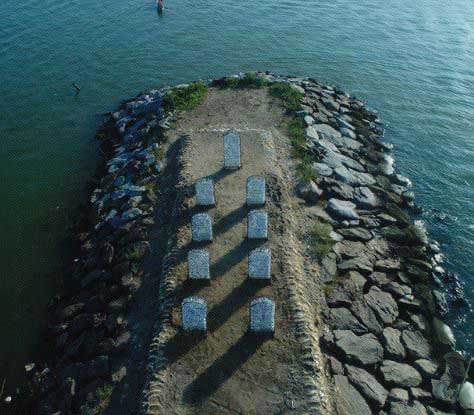
A CEMETERY LIKE NO OTHER
After nearly a decade of cleaning up these water bodies, Jellyfish had a eureka moment when it decided to up the ante about the state of our rivers—via art.
Their other event, a paddling expedition called Muziris Paddle, is held in partnership with the Muziris Heritage Project, under the Kerala Tourism department. The story of Muziris starts from 3000 BC when Babylonians, Assyrians and Egyptians came to the Malabar coast in search of spices.
Today, the port city is also part of the Kochi-Muziris Biennale, an international exhibition of contemporary art held in Kochi city in Kerala. It is the largest art exhibition in the country. During the event a few years ago, participants got an opportunity to visit the legendary Muziris heritage sites on the way.
Kaushiq set up the world’s first Marine Cemetery at the Beypore beach on December 4, 2019, World Wildlife Conservation Day. An art installation made up of 2,000 plastic bottles collected from the beach, it has nine markers, each dedicated to an endangered marine or riverine species, built with the plastic bottles encased in gravestone-shaped iron frames. Eight of these markers are four feet in height and dedicated to the seahorse, parrot fish, leatherback sea turtle, eagle rays, sawfish, dugong, zebra shark and hammerhead shark. The tallest marker, measuring six feet, is dedicated to Miss Kerala, an endangered native freshwater fish.
“Our Marine Cemetery got a lot of coverage nationally and internationally,” says Kaushiq. “We started getting calls from conservationists in the UK and a few other places, all offering help by spreading awareness.” For now, the art installation has been removed from the spot allotted by the local authority since the patch had to be reclaimed for other use. Jellyfish is committed to erecting the Marine Cemetery at an alternative site and is open to teaming with like-minded people who have similar passion and drive for the planet.
FUNDING THE PROJECT
Kaushiq did not wait for external funds or bank on fundraising. He put in his own money to make sure there were no hitches. “We have spent close to ₹3 crore so far. This includes getting supplies, equipment, infrastructure, spreading awareness, collaborating with other businesses and enterprises, etc. For us, this is a passion project,” he says with emphasis.
SHALLOW WATER, DEEP IMPACT Fifteen events and thousands of paddle strokes later, the Chaliyar and Muziris River Paddle events have had a positive impact on the environment and also the local residents. Kaushiq says: “First, it has resulted in a cleaner river and we’ve even started to see new species of fish in the water. Second, we’ve taught the fishermen about the impact of plastic pollution, conservation practices, safety procedures and the importance of PFDs (Personal Floatation Devices). They are able to work for Jellyfish events and the Beypore Waterfest as support staff, lifeguards, rescue boat operators, or even as participants.”
SAFETY FIRST AT JELLYFISH
Jellyfish has partnered with legends of kayaking like Australian woman paddler Sandy Robson, Nepalese kayaker and rescue instructor Chandra Ale, and Indian kayaker Anvesh Thapa for high- quality training sessions and conservation drives over the years.
Three years ago, Jellyfish organised a first responder training (Durantha Nirvana Sena) and Mission Raksha Program together with the Police, Fire & Rescue and Powra Samith, a first responders’ network created by locals to train the fishermen’s community and other locals to prepare for and handle disasters such as fires, floods and other incidents requiring rescue operations.
The impact of this training came in handy during the Kerala floods in 2019 when fishermen and officials used Jellyfish’s equipment for search and rescue operations.
BACKING AND GROOMING WATER SPORT ATHLETES
Jellyfish supports budding athletes, water sports events and has sponsored two of India’s top whitewater kayaking festivals: the Ganga Kayak Festival in Rishikesh and the Malabar River Festival in Kodencherry, Kerala.
Kaushiq says with pride, “We have world-class coaches and equipment that provide young athletes the essentials they need to better themselves and develop their skills. Currently, we sponsor Naina Adhikari, India’s leading female whitewater kayaker in all her competitions and expeditions.”
SCALING UP IN THE FUTURE
Jellyfish introduced rowing and dinghy sailing as new activities last year. In the pipeline are plans to set up the Jellyfish Yacht Club, expand their reciprocal club network, and tie up with like-minded clubs in the country and internationally. “We intend to expand our franchise and conduct events across Kerala. There has been keen and growing interest from other districts and their tourism departments. Over time, we want to eventually take Jellyfish across India, the Middle East, Far East and Europe,” says Kaushiq.
“Many of our clients are loyal customers who regularly return to Jellyfish. Sixty percent of our River Paddle Clean-up participants are repeat customers who attend the event every year. Their enthusiasm and passion is motivating,” says Kaushiq, who has led most of these expeditions.
DESI AT HEART
“For us this is a home away from home. Calicut is a large part of our lives and whether near or far we want to do whatever we can to help it become a sustainable place,” says the pravasi who left India in 1996 for global career prospects.
This NRI family’s passion, love for the motherland and sustainable proactive measures to clean up the rivers of their home state may just lead to Miss Kerala swimming around in these waters once again in the near future!
Writer, progressive Slackline athlete/trainer, earth guardian.
@kaushiqkodithodika @jellyfish_watersports


